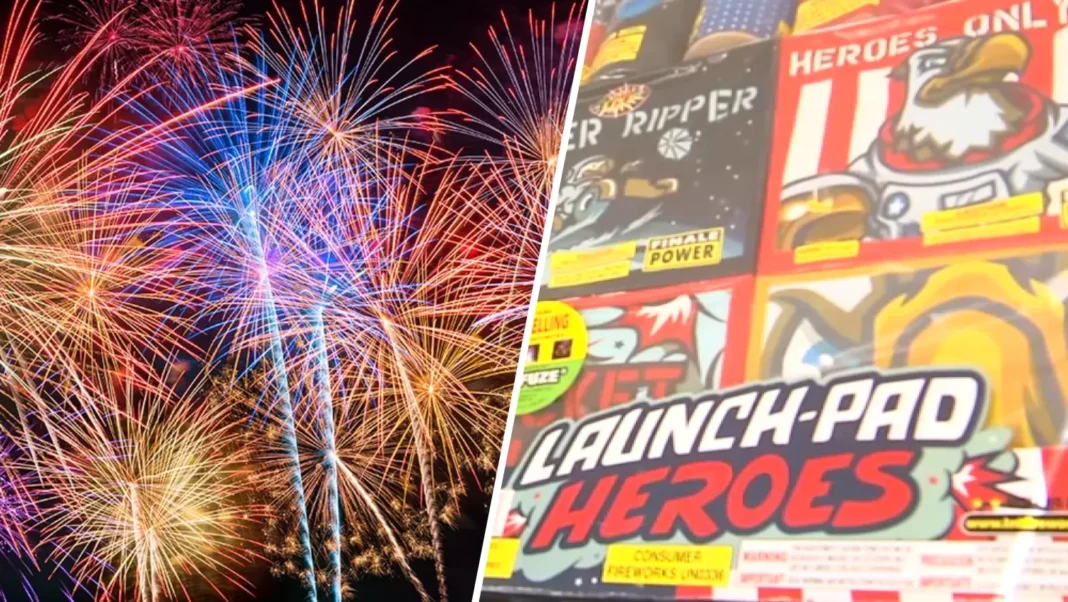The Fourth of July is a day that holds a special place in the hearts of Americans. It is a day of celebration, a day of remembrance, and a day of unity. It is a day when families and friends come together to honor the birth of our nation and to enjoy each other’s company. And what better way to celebrate than with a grand display of fireworks?
The Fourth of July is synonymous with large gatherings of family and friends, barbecue and, of course, dazzling fireworks. As the United States celebrates its independence on July 4, streaks of color will light up the night sky. While fireworks displays are planned across the Chicago area, some people choose to set off fireworks themselves.
For Illinois residents thinking about doing so, take note. Illinois is one of three states that ban some or all consumer fireworks, though they can be purchased in bordering states like Indiana and Iowa. Under the Pyrotechnic Use Act, which was signed in 1942, the purchase, sale and possession of “consumer fireworks” are prohibited statewide.
However, Illinois residents can legally possess certain items under state law, which are considered “novelty effects” and not “consumer fireworks.” These include smoke devices, snake or glow worm pellets, trick noisemakers known as “party poppers,” “booby traps,” “snappers,” “trick matches,” “cigarette loads,” and “auto burglar alarms.” Sparklers, toy pistols, toy canes, toy guns, and other devices that contain a small amount of explosive compound are also allowed.
It’s important to check your local laws regarding novelty effects. Each municipality can implement an ordinance banning such items, so it’s best to see what the situation is in your community before purchasing. For example, in the city of Chicago, all fireworks, including sparklers, are illegal.
Certain consumer fireworks are permitted under strict conditions, including “fountains,” “shells,” and “parachutes.” These items are firework devices designed to produce low-level aerial effects, which are propelled into the air by a lift charge. Shells will burst at the peak of flight to create a display of stars, reports, or other effects or leave a trail of sparks until exhausted. These items contain a maximum of 40 grams of chemical composition and no more than 20 grams of lift charge.
However, there are some fireworks that are prohibited in Illinois on a state level. These include handheld fireworks, bottle rockets, skyrockets, Roman candles, chasers, buzz bombs, ground items other than those identified as “approved consumer fireworks,” helicopters, missiles, pinwheels, planes, sky lanterns, and firecrackers of all types.
According to the state fire marshal, consumer fireworks displays are permitted only in places that have passed measures allowing them. In order to have a consumer display using approved fireworks, a resident must receive training at the local fire department, undergo a site inspection, and apply for a permit through a local government agency.
Despite consumer fireworks being available to those who complete the process, the State Fire Marshal strongly recommends residents experience displays put on by professionals instead. “Fireworks are never safe, and the only thing we can do is mitigate the potential danger,” the agency stated. Illinois’ complete list of Approved and Prohibited Consumer Fireworks and Unregulated Novelties can be found on their website.
For those who reside in Indiana, the laws differ greatly from Illinois. Consumer-grade fireworks, also known as 1.4g fireworks, can be used legally under state law, though they may be banned under local ordinance. Display fireworks, meanwhile, are not legal without state and federal permits, according to the Indiana Department of Homeland Security.
Here’s additional information about the use of fireworks in Indiana, including the legal purchase age, hours, and more:
– Fireworks can only be purchased by persons 18 years of age or older.
– Use is limited to personal property, the property of someone who has approved the use of fireworks, or a location designated specifically for the use of consumer fireworks.
– It is legal to set off fireworks from 9 a.m. to 11 p.m. throughout the year, although hours might be limited by local ordinance.
– The times on the following dates are protected in Indiana for consumer use of fireworks and may not be prohibited by local ordinance, according to IDHS:
– June 29 to July 3: from


